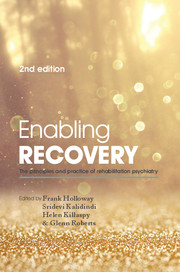Book contents
- Frontmatter
- Contents
- List of contributors
- List of figures, tables and boxes
- Preface
- Part 1 Setting the scene
- Part 2 Treatment approaches
- Part 3 Key elements of a rehabilitation service
- Part 4 Special topics in psychiatric rehabilitation
- 23 Special topics in psychiatric rehabilitation: overview
- 24 Rehabilitation and acquired brain injury
- 25 Autism spectrum disorder
- 26 Risk management in rehabilitation practice
- 27 Rehabilitation: an international perspective
- 28 Psychosocial rehabilitation across culture: the experience in low- and middle-income countries
- 29 Expanding the evidence base
- Part 5 Future directions
- Index
24 - Rehabilitation and acquired brain injury
from Part 4 - Special topics in psychiatric rehabilitation
Published online by Cambridge University Press: 02 January 2018
- Frontmatter
- Contents
- List of contributors
- List of figures, tables and boxes
- Preface
- Part 1 Setting the scene
- Part 2 Treatment approaches
- Part 3 Key elements of a rehabilitation service
- Part 4 Special topics in psychiatric rehabilitation
- 23 Special topics in psychiatric rehabilitation: overview
- 24 Rehabilitation and acquired brain injury
- 25 Autism spectrum disorder
- 26 Risk management in rehabilitation practice
- 27 Rehabilitation: an international perspective
- 28 Psychosocial rehabilitation across culture: the experience in low- and middle-income countries
- 29 Expanding the evidence base
- Part 5 Future directions
- Index
Summary
Introduction: the relevance of acquired brain injury
Acquired brain injury (ABI) is relevant to psychiatric rehabilitation for two reasons. First, it is common. Recent figures from the UK show that approximately 700 000 people attend accident and emergency departments each year with a head injury. Of those, approximately 90% will have minor injuries without life-altering consequences; however, the remainder will have a diagnosis of moderate or severe brain injury with life-altering effects. It is estimated that there are 500 000 individuals aged 16–74 in the UK who are living with long-term disabilities as a consequence of ABI (see the website of the brain injury association Headway UK, http://www.headway. org.uk). Second, ABI is associated with extensive psychiatric comorbidity. It is well recognised that the psychological sequelae of brain injury are more common than physical sequelae. Box 24.1 lists the psychiatric diagnoses associated with ABI. Depression, anxiety and sleep disorders are common; there is an increase in suicide rates compared with the general population; substance misuse and dependence rates are higher and there is also a significant link between schizophrenia and brain injury. Even if no formal psychiatric diagnosis can be made, there will often be cognitive, emotional and behavioural changes or changes in personality that result in breakdown of relationships and loss of occupation.
Box 24.1 ICD-10 psychiatric diagnoses associated with acquired brain injury
• Organic hallucinosis
• Organic catatonic disorder
• Organic delusional (including schizophrenia-like) disorder
• Organic mood (affective) disorder
• Organic dissociative disorder
• Organic labile disorder
• Organic personality disorder
• Mild cognitive disorder
• Post-encephalitic syndrome
• Post-concussional syndrome
• Other organic personality and behaviour disorders due to brain damage
• Delirium, not induced by alcohol and other psychoactive substances
• Dementia in other specified diseases classified elsewhere
• Unspecified dementia
• Organic amnesic syndrome, not induced by alcohol and other psychoactive substances
• Other specified mental disorders due to brain damage
- Type
- Chapter
- Information
- Enabling Recovery , pp. 359 - 373Publisher: Royal College of PsychiatristsPrint publication year: 2015



